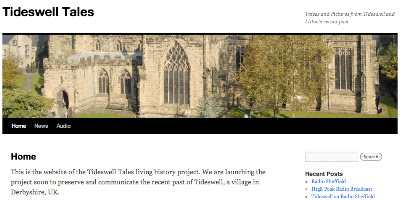Tideswell Living History Group will launch the Tideswell History Telephone on Friday 11th April. This is the first time an unused iconic red telephone kiosk still in its original location has been turned into a permanent oral history audio heritage centre.
Residents and visitors will be able to dial-the-past to listen to Tideswell folk talking about village history using a specially adapted and free pay phone. The kiosk will also feature a gallery of archive photographs about the village. The rear of the kiosk will feature a specially written poem about using the phone to communicate in the days before mobiles and Twitter. The poem, called ‘An Ode T’ T’owd Phone Box’, was written by Dave Greenan and was the winner of a poetry competition in 2013.
The oral history recordings and photographs have been collected by members of the living history group over the last two years as part of the Tideswell Tales project. This is a community-led history project supported by the Heritage Lottery Fund and co-produed with inHeritage. We came up with the idea, liaised with Blackbox AV who supplied the unit, edited the audio and advised the group during the process of creating the 'heritage centre in a box'. The Peak District National Park Authority has paid for the cost of refurbishing and cleaning the box through the Sustainable Development Fund.
Judy Cooke, Vice Chair of Tideswell Living History Group said "Funding has helped us to preserve the distinctive telephone kiosk in its original position in Fountain Square after the Parish Council bought it from BT for £1. In the days before mobile phones and before most people had landlines, this was one of the lifelines for residents to communicate in emergencies or get in touch with friends and family. The box is in a central location and has been part of Tideswell life for generations, with many stories to tell. It has been transformed to tell many more. We hope it will help residents rediscover their past and visitors to learn about the people's history of Tideswell."
All calls are free and you can’t dial 999 for emergency services! Oral history and photographic displays will be changed regularly from the large archive collected by the group. You can also explore more of the archive by visiting http://tideswelltales.wordpress.com.
The launch takes place on Friday April 11th at 12pm. Local historian Tony Hill will unveil the box. There will be free tea, coffee and biscuits along with a display of more photos in the Vestry of Fountain Square Church.
We are a group of people living in Tideswell and Litton, Derbyshire who wish to preserve our recent past through memories, photographs, anecdotes, news stories and other sources.
About the Heritage Lottery Fund
Using money raised through the National Lottery, the Heritage Lottery Fund (HLF) aims to make a lasting difference for heritage, people and communities across the UK and help build a resilient heritage economy. From museums, parks and historic places to archaeology, natural environment and cultural traditions, we invest in every part of our diverse heritage. HLF has supported almost 36,500 projects with more than £6bn across the UK. www.hlf.org.uk.















